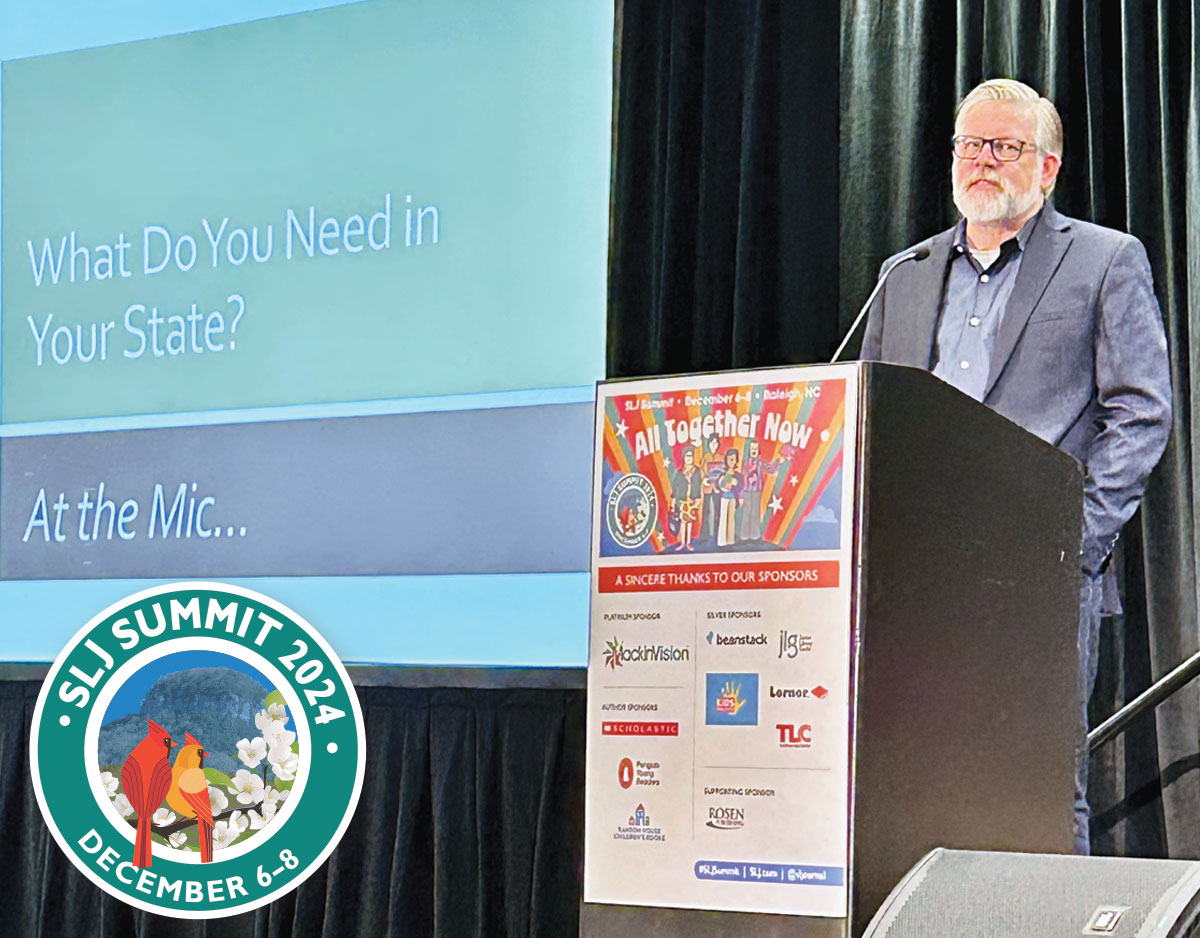Time to Turn Talking Points to Policy | 2024 SLJ Summit
EveryLibrary executive director John Chrastka spoke at the 2024 SLJ Summit, providing a playbook for statewide strategies to prioritize and protect school libraries and librarians.
 |
John Chrastka .... |
EveryLibrary executive director John Chrastka had a clear message for the 2024 SLJ Summit attendees: the days of catchy slogans and clever T-shirts are over. It’s time to push for policy, not echo talking points. Time for school librarians to sit down with legislative committees and take their place as serious negotiators with a fundamental role in education.
“I believe that we've been doing ourselves a disservice over the last, say, 25 or 30 years, when we are looking at advocacy and activism—the idea that we need to get loud for libraries and then have a negotiation with the judiciary committee, the education committee, where we look like we're supposed to be standing on barricade wearing T-shirts and rallying for things,” Chrastka said.
Advocacy, he said, is co-creation; activism is about crisis and seizing opportunities.
“These are different modes of behavior,” he said.
While school librarians and their allies fight for First Amendment rights against censorship and seek to support students whose 14th Amendment rights are at stake as civil rights are eroded, the constitutional discussion around libraries actually lies in the 10th Amendment, which states, “The powers not delegated to the United States by the Constitution, nor prohibited by it to the States, are reserved to the States respectively, or to the people.
Education and libraries are not in the federal constitution, Chrastka noted.
“We are in a 10th Amendment conversation right now, especially considering we have no idea what's going to happen in America, Congress, the Department of Education, and the Institute of Museum and Library Services,” he said.
“In your state constitutions and your state laws is where education and libraries live,” said Chrastka. “The First Amendment [and] the 14th Amendment are essential, but the 10th Amendment is how you get paid to do the work you want to do every day, how you can afford to have collections and support the curriculum. How education is structured, fundamentally is a 10th amendment conversation, state by state by state.”
These battles have been playing out in state legislatures across the country. Chrastka shared some strategies that are working for librarians and their allies:
n Changing from talking points to policy:
Issue briefs need to be written that put school librarianship on par with other educators in discussing the structure of education, funding, and formulating policy to support them doing their jobs.
- Candidate and school board surveys:
In supportive environments, ask the legislature about funding education policy, their belief systems, and thoughts on education. In hostile places, find the people who stand with you, and work with them and their staff. - Identifying and training witnesses for hearings and engaging with media:
Librarianship cannot afford unprepared, superficial testimony and allow the opposition to dominate the media. “If they only hear from Moms for Liberty, we’re doing ourselves a disservice.” - Coalition work:
Disciplined engagement among library organizations and stakeholder groups has overcome anti-library legislation. In unionized states, unions are some of the most impactful allies.
“Some of you are in states where you can get stuff done,” Chrastka said. “That is a powerful situation for two reasons: One is you need to get those things done when they are specifically caucused at the state-by-state-by-state level. The other reason is municipal momentum to push against where things are going in other states.”
It may seem like a contradiction to say that this is not a federal discussion, actions need to be taken at the state level; but also that what happens in each state impacts the country as a whole. Actions in one state inform another.
“This is not a zero-sum situation,” said Chrastka. “One group's difficulties and the other group's successes are additive to each other, because we have to stand in solidarity with each other.”
RELATED
The job outlook in 2030: Librarians will be in demand
The job outlook in 2030: Librarians will be in demand
ALREADY A SUBSCRIBER? LOG IN
We are currently offering this content for free. Sign up now to activate your personal profile, where you can save articles for future viewing






Add Comment :-
Be the first reader to comment.
Comment Policy:
Comment should not be empty !!!